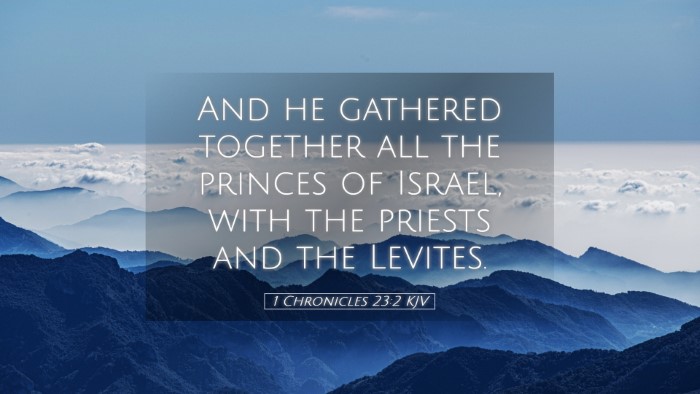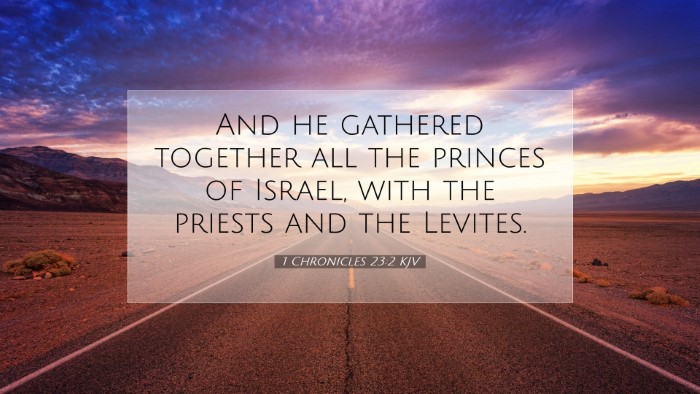Commentary on 1 Chronicles 23:2
Bible Verse: "And he gathered together all the princes of Israel, with the priests and the Levites."
Introduction
The verse in 1 Chronicles 23:2 serves as a pivotal moment in the enumeration of the duties and structures within the Levitical priesthood. This chapter outlines King David's intentions to organize the temple services in preparation for the eventual construction of the temple. Understanding this verse requires delving into the broader context of the biblical narrative, as well as the specific roles and significance of the figures mentioned.
Gathering of the Leaders
David's act of gathering the leaders, which includes princes, priests, and Levites, illustrates his desire for unity and collaboration in worship and governance. This gathering signifies several important theological and practical implications:
- Unity in Worship: The fact that David called upon various leaders underscores the principle that worship is to be conducted in a communal spirit, involving all levels of leadership.
- Authority and Structure: David establishes a clear structure for temple service. His authority as king is evident in his ability to summon these leaders to a common cause.
- Preparatory Role: This gathering foreshadows the importance of the temple in Israel's national life, particularly how it would serve as the center for worship and community identity.
Insight from Matthew Henry
Matthew Henry, in his commentary, emphasizes that the assembly reflects David's commitment as a leader. He notes that David’s governance was characterized by a strong sense of duty toward spiritual matters:
“David brought together the princes of Israel, seeking to ensure that all aspects of the nation would align with their covenantal responsibilities before God.”
Henry further elaborates on the importance of the priests and Levites:
“Their role was not merely functional; they were the spiritual caretakers of the nation, and their duties were to be foundational to the worship experience.”
Insights from Albert Barnes
Albert Barnes provides valuable exposition regarding the historical and cultural context of this gathering:
“In assembling the leaders of the nation, David reaffirmed his leadership role as the divinely appointed king, maintaining that spiritual governance is as crucial as political governance.”
Barnes takes note of the responsibilities that would fall upon the Levites, highlighting a principle that leadership in Israel should always reflect service to God:
“The Levites are called to serve, illustrating that high office comes with great responsibility, both to God and to the community.”
Insights from Adam Clarke
Adam Clarke reflects on the significance of involving the divisional aspects of Israel’s leadership with the priests and Levites:
“This convergence of leaders illustrates a model for church structure; the collaboration between civil and religious authorities is paramount in ensuring righteousness in governance.”
Clarke emphasizes the role of the Levites, noting that:
“As they were tasked with the management of the holy things, their readiness and commitment were crucial to the success of the reverent service God demanded.”
Theological Implications
This verse, while historical, carries theological weight that resonates with contemporary readers:
- The Role of Leaders: The gathering serves as a reminder of the importance of leaders in spiritual matters, echoing the call for modern leaders within the church to prioritize worship in their governance.
- Community and Worship: It highlights the necessity of collaboration among various ministries and church leaders, promoting a united front in worship efforts.
- Preparation for God's Purpose: David’s organization underscores the importance of preparation in fulfilling God’s plan for His people, a principle that applies to church planning and ministry today.
Conclusion
1 Chronicles 23:2 encapsulates crucial aspects of leadership, community, and worship within the Israelite context. The insights gleaned from public domain commentaries by Matthew Henry, Albert Barnes, and Adam Clarke provide a multi-faceted understanding of this verse, enriching our comprehension of biblical governance and worship. As contemporary followers of Christ navigate the complexities of church leadership and community, the principles established in this verse remain relevant and instructive.


